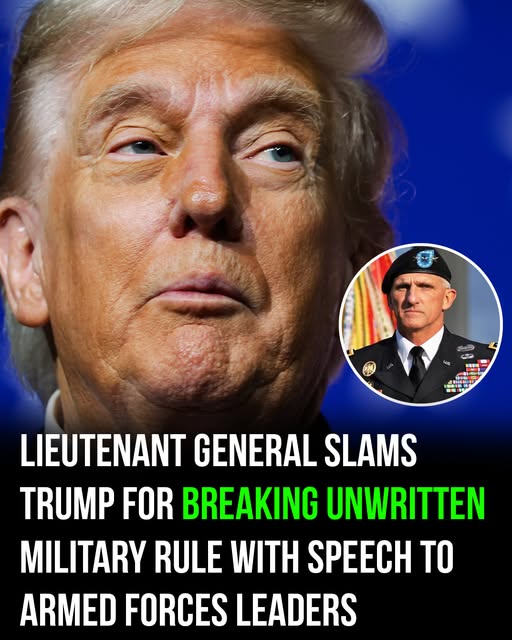Rather than addressing operational needs or emerging threats, Hegseth’s remarks struck many in the audience as political theater. One defense official, speaking later on condition of anonymity, said the presentation felt “more like a press conference than a strategy session with commanders.” Another put it more bluntly: “This entire event could have been an email.”
What drew the sharpest criticism, however, wasn’t just the content of Hegseth’s speech, but the setting. Broadcasting a message designed for political optics while simultaneously concentrating the nation’s top brass in one place was, in the words of one retired officer, “an inexcusable strategic risk in exchange for an inane message of little merit.”
Trump’s own remarks followed and proved equally wide-ranging. He revisited his now-infamous line about “two N words” (clarifying once again that the second meant “nuclear”), mused about readiness, and attempted to bolster Hegseth’s critiques of the current force. But the former president’s delivery reportedly left the room cold. Observers noted his demeanor seemed “rattled” by the restrained response of his audience, many of whom sat in silence rather than offering applause.
The meeting’s aftershocks reverberated quickly, spilling into the public sphere when retired Lt. Gen. Mark Hertling—former commanding general of U.S. Army Europe and Seventh Army—spoke out directly. Appearing on MSNBC, Hertling said the entire event violated a foundational leadership principle: “You praise in public and discipline in private.” What happened at Quantico, he argued, flipped that maxim on its head. Instead of encouraging leaders, the speeches humiliated them on camera, turning what should have been a closed-door professional briefing into a televised scolding.
Hertling minced no words in his assessment. He argued that the secretary’s address publicly shamed the force and veered dangerously close to urging officers toward actions inconsistent with their oath. “There’s a line between lawful directives and those that cross into illegality or ethical compromise,” he said, adding that commanders would now have to sift carefully through the aftermath, separating what was lawful military policy from what was mere political rhetoric.
To be fair, Hertling acknowledged that not every item on Hegseth’s checklist was unreasonable. Calls for tightening physical fitness standards, for example, fall well within the scope of lawful and practical measures. Likewise, efforts to tackle pockets of poor readiness are issues commanders have long experience handling. But he drew a bright line at the suggestion of blanket judgments—particularly those aimed at women already serving in combat roles who have met every existing requirement. To impose restrictions based on outdated perceptions rather than performance, he warned, would not only be unlawful but destructive to unit cohesion.
Hertling was also unequivocal on one point: officers will not carry out illegal orders. “That’s not how this institution works,” he said. “There are professional lines that will not be crossed.” He added that many in the audience were not only personally embarrassed by the tone of the remarks but also felt shame on behalf of their services. Being dressed down in such a public and politicized manner, he argued, undermined the respect between civilian leadership and the military, a relationship built on mutual trust.
What made the event all the more jarring was its contrast with longstanding traditions of civil-military interaction. Historically, presidents and secretaries of defense have addressed commanders in settings designed to strengthen unity, clarify strategy, and inspire confidence. Praise was delivered publicly, while criticism was reserved for private channels where it could be constructive rather than performative. The Quantico gathering inverted that model, turning the nation’s top military officers into props for a message aimed more at television audiences than at solving real operational challenges.
In Hertling’s view, the damage went beyond bruised egos. He warned that the public shaming risked creating a wedge between the military institution and the citizens it serves. “The American people expect their armed forces to be apolitical, professional, and focused on mission,” he said. “Events like this muddy those waters, making it harder for the force to maintain that sacred trust.”
The retired general’s critique quickly circulated online, sparking debate about the appropriate boundaries of political speech in military settings. Supporters of Hegseth defended the speech as necessary “tough love” aimed at restoring discipline, while critics saw it as yet another attempt to politicize the force for partisan gain.
Inside the Pentagon, the mood was described as one of quiet frustration. Several senior officers, speaking privately, echoed Hertling’s points. They expressed concern not only about the optics but about the practical risks of having so many high-ranking leaders out of position simultaneously. “If a crisis had broken out that day in the Pacific or the Middle East,” one officer said, “we would have had a real problem.”
Ultimately, the Quantico meeting may be remembered less for the substance of what was said than for the breach of unwritten rules it represented. Leadership, Hertling reminded viewers, is not about spectacle—it is about respect, responsibility, and the careful stewardship of those you command. By shaming officers in public and blurring the line between politics and professionalism, Trump and Hegseth created a moment that many in uniform will not soon forget.
Whether the event marks a turning point in civil-military relations or simply another flashpoint in a turbulent political era remains to be seen. But for those who were there, and for those watching closely, the message was clear: the trust between America’s leaders and its military is a fragile thing, and once undermined, it is not easily repaired.

